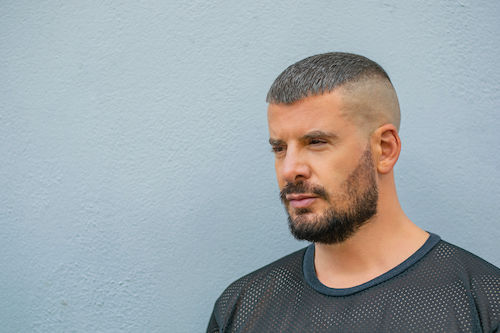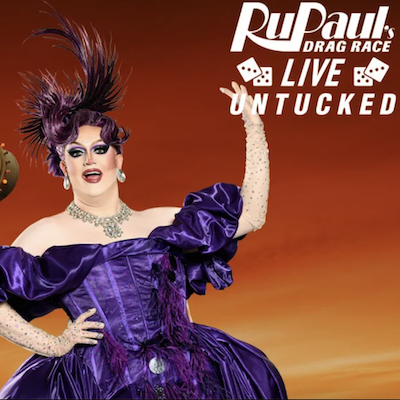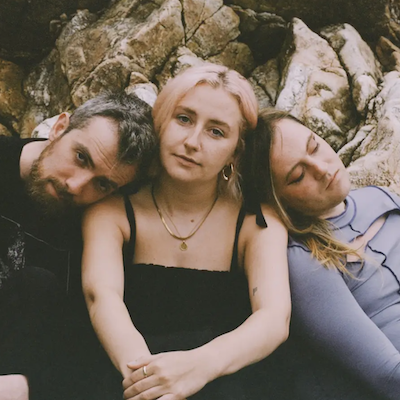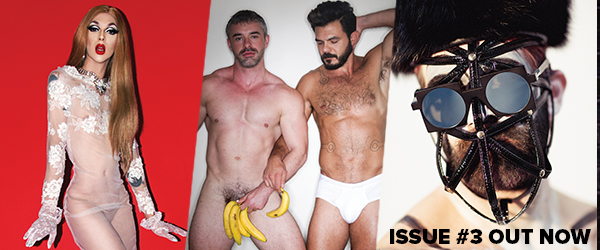
Queer theatre maker Alexis Gregory is set to take over Bethnal Green’s Town Hall Hotel, the Council Chamber no less with his raucous new romp, FutureQueer. The new show takes place in the year 2069 and sees Alexis incorporate his stand-up skills, give a DIY queer lecture and discuss the goddess of Disco herself, Donna Summer.
The show sold out earlier this summer and is only on for two nights this month, each performance followed by a Q&A with Alexis. We caught up with the creator to find out more…
Alexis, hello, I love how youre works balances moments of darkness with the light. How do you navigate between the two?
So like all my work, FutureQueer, and its content, veers between the comic and the brutally hard-hitting. I do actual stand-up comedy in this show, and the show is full of in-jokes for the queer community and our allies. I love writing, and performing, both comedy and the more dramatic material. Switching between the two, often enhances both for the audience.
FutureQueer takes us to the year 2069! What inspired you to time travel into the future?
Obviously, for the LGBTQ+ community, we have seen major social, and political changes in the last couple of decades, but as we have also recently seen, we are also regressing in many ways. What if, collectively, it ‘doesn’t get better’ in the future? What if this push and pull continues into the future. Also, how will queer people respond to the changing world? Like all my shows, FutureQueer is multi-themed, and we cover a lot of ground in its 60 minutes.
Is part of this a coping mechanism to deal with the present?!! I know I mentally retreated to Medieval England in 2020. Lol.
God, I feel like going back further than the medieval days sometimes. Well we, as a society, do tend to get culturally nostalgic, with a desire to return to previous times, when life is tough. It’s interesting that we had that most recent disco revival a couple of years ago, corresponding with the pandemic, and lockdowns, and their aftermath.
FutureQueer is a meditation on disco music as a metaphor for Queer survival. Tell us more about how Disco has helped you personally?
I discovered disco as a young queer kid and it spoke to me. Though I couldn’t articulate it, I knew it was ‘other’. I love how disco has also never gone away. It’s just mutated and changed into other forms, or quite simply, also stayed as out-and-out disco. Of course, as Queer people, we have a massive legacy of finding ourselves, and others like us, on dance floors. I loved clubbing when I first came out, and did it for years. I then had several years break from the clubs, and then returned and had a second coming out. It was fun. Now I don’t go to clubs anymore. I actually had to leave Pret-a-Manger the other day because the music was too loud.

I know that you will be armed with a Donna Summer vinyl in the show. She had her own complicated relationship with the Queer community. How do you feel about her?
Well I think it’s the other way round, and the Queer community has a complicated relationship with Summer. Full disclosure; I am a massive fan, and so may be biased. I don’t believe Donna said anything with ill intent, and I certainly don’t believe that she said what has been credited to her.
It’s possible that Summer did say something that was badly worded, at a time of mass panic and widespread fear about this new virus, and it got blown out of proportion, or that the fall-out could have been handled differently.
When I see footage of Donna on stage, she is goddess-like, emanating love, not hate, and let’s face it, Summer would have spent her whole career surrounded by gay people. I think we also like to believe a religious person is bigoted, and that isn’t always the case. I have studied the whole incident, and it’s complex, and also very hard to find eye-witness accounts of the one night in concert she was alleged to make such remarks. Most people, don’t even know the context of the rumours, and just repeat ‘Donna Summer hated gay people’, or ‘Donna Summer said AIDS was God’s revenge’. I don’t believe everyone saying these things has done their own research. In FutureQueer, I look at how ‘I Feel Love’ has endured for forty-six years. Interestingly, ‘that’ rumour has also done so, for nearly as long. This is my short answer to your question by the way.
FutureQueer sounds like it will be pretty raucous. As a writer/director how do you go about creating this space for an audience where they feel they are included in the party?
The show is wild, outrageous, camp, and very queer, from the moment it starts. I often say that doing a solo show is like a conversation between the audience and me. FutureQueer really feels like that, and the fourth wall is beyond non-existent. I think these performances will really be fun night out for the audience, and it is a show in which the audience never know what is happening next.
In FutureQueer in 2069, there is a statue for George Michael on Hampstead Heath. There has been a real resurgence on Instagram of the pictures of him cruising recently. Maybe it’s just my own personal algorithm. Lol. What did you make of the way he was so unashamed of that period? What were your memories of that time?
I remember the ‘90s as not being that progressive to be honest. It felt like we were often only safe on the Gay Scene, as it was called then. You really, still, had to find your tribe. Regarding George Michael, as I have got older, I look at that extraordinary ‘90s period of work from him in a new way. Of course we know ‘Fast Love’ is about cruising, and ‘Outside’; again, disco – check out about the mens loos turning into a dance-floor in the video, is about outdoor sex. Now I understand his other songs differently. ‘Spinning The Wheel’, about open relationships, and ’gambling’ with a lovers life in the pre-med era, ‘You Have Been Loved’ about meeting the mother of your deceased HIV+ gay lover for the first time, to both lay flowers on his grave. We live in this world of mass-queer visibility now, but who is ‘really’ exploring the queer experience now, as truthfully as George Michael did all those years ago; really exploring what it means to be queer and our specific experiences? Not as many artists as we may actually think.
The show launches on 20th November which is International Transgender Day of Remembrance. Does FutureQueer look at any specific Transgender icons who are no longer with us? Who are your own Trans icons and why?
I do explore trans icons in FutureQueer, yes, and I look at being trans in the future. I also present the story of a member of the trans community, who may not be widely known to the public, but who’s story came to me via Ben Hunte’s report for Vice. Ben kindly , and generously, gave me permission to include his report in my show. It’s a stand-out moment in the show. Who are my trans icons? Those people who are out there, making a difference, turning it, and us out; Michelle Ross of cliniQ, Miss Kimberley, Campbell X, Jaxon Feeley, Henri Rex. I am lucky enough to call some of these people friends, and collaborators. My first trans icon was a friend from around twenty five years ago. We worked together in a gay bar in Soho. Everyone loved her. Looking back, I recall her and I never once spoke about her being trans. This wasn’t because it was a consciously unspoken thing as far as I am aware. We just inherently understood each other. That is quite extraordinary when I think back on it now. We lost touch. I often think of her.
FutureQueer is the first show as part of Bethnal Green Town Hall Hotel’s new cultural programme. How major. What does this mean to you?
I love doing new things with my work, and presenting it in new ways, and giving the audience a new experience. Each of my shows are also different from my previous, yet they fit together. I was invited by Michael Berg, Head of Events & Cultural Partnerships at the hotel to present some work. we chose FutureQueer between us, and decided to take this bold, unusual step with it.
The space in their Council Chamber looks like it will be really fun to perform in. Tell us more about the space and how you will be utilising it?
The Town Hall Hotel is an extraordinary building. You really feel like you are stepping back in time when you enter it. So it’s a nice juxtaposition to focus on the future in the building too. The ex-Council Chamber is an extraordinary wood panelled space. FutureQueer is part lecture, so it works well in that formal environment, though of course the show is queer, and bold, and in your face, so there is that nice contrast too. We’re bringing in a lighting team to elevate the whole space. It will look stunning. I like the idea of queering up a rather formal looking space too.
There will be a Q&A post event. What question would you most like to be asked?!
‘When are you next performing FutureQueer?’, which is a question people often ask in that situation. This is so that I can reply there are currently no further plans to perform the full show, so catch it while you can. I’ve done lots of shows over the years that have returned many times, but now I’m working in a new way.
Lastly we know you love Mariah’s ‘The Roof’ – 100% relatable. If you were to choose one of Donna Summer’s tracks which would be your No1 and why?
I still love The Roof, including the latest remake with Brandy. Though I’m still in recovery over the accompanying video, in which Mariah dishes out notes to Brandy, as if she’s some ingenue Karaoke bar singer, that she plucked from obscurity only two days earlier. Back to your Donna question, Like any favourite artist, with a wide and varied body of work, my favourite changes all the time. Today, I’m going to say ‘Friends Unknown’; a ballad that only the die-hard fans know really. From Donna’s 1991 ‘Mistaken Identity’ album. Donna is on top form, vocally, throughout this whole album. There is an extraordinary outdoor, live performance of the song on Youtube. I think when Donna got her star on the Walk of Fame. She tears the skies down. Just her, on the sidewalk, with a mic in hand. That’s all a true diva needs.
FutureQueer takes place 20-21 November at the Town Hall Hotel in Bethnal Green.
For more info and tickets see FutureQueer.
Main image by Adán Romero
Photo of Alexis by Adrian Leca









